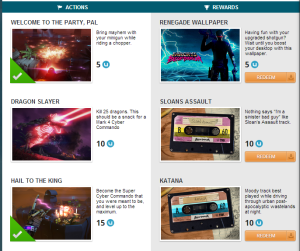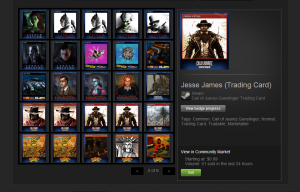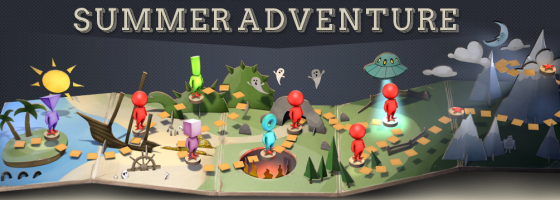On my recent podcast with Nicholas from Samurai Punk, we got on the subject of Steam and more specifically about the challenges of competing against it. For years now industry experts have talked about the market control of Steam over the PC industry and many people don’t like how Steam has become a monopoly and would like a competitor to appear. But thinking about it more, it’s not just creating a digital platform and the problems with finding a true competitor is an almost impossible task.
The Current Market:
Steam’s control over the PC market is just about absolute as according to their stats they easily have more than 5 million concurrent users on Steam a day and reports estimate that they control over 70 percent of the market share when it comes to the PC market.
In a previous post I talked about some of the major points of why Steam is a success compared to other DRM services so I won’t repeat that here. But the short story is that Steam is for many people the one and only digital platform for PC games and this is where the talk of competition comes in.
Competition is a great thing as it challenges companies to do better and gives the consumer choice instead of only having one option. But the problem is that for the life of me, I can’t think of any game company today that could compete with Steam and yes I’m including GOG in there. I love GOG and have a library of games with them, but their numbers are a lot different than what Steam has on a daily basis.
During our conversation we both agreed that it’s not just about creating a new platform and expecting money to come in and there are several obstacles standing in the way for a new platform to enter the market.
Functionality:
We can say that Steam isn’t perfect and there is always room for improvement in terms of functionality and accessibility, but for a new platform to compete they would need to meet and beat Steam’s options as they stand. That means integrated friend’s list and chat, cross game communication, sales and too many more to list here. One of the big problems that UPlay, GFWL and Origin all had with competing against Steam was that they came out with less functionality than the current leader.

UPlay like other digital platforms was horrible out of the gates and left a bad impression for gamers who continued to go to Steam.
The point about competition is that if you want to compete with someone, you need to be better than they are at some aspect. You can’t come out with an inferior product and say that you’ll improve over a few years and then you’ll be better than the competition.
Incidentally this is also why so many MMOs over the last decade failed miserably trying to compete with WoW because it was always growing and improving thanks to their massive funding. No other MMO could directly compete with WoW head to head with features as it was a never ending uphill battle, but other studios still tried to be the WoW killer.
But let’s say that a platform does come out and in every way better than Steam, would they easily take over the market? The answer to that is no and it brings us to the next hurdle.
Developer Risk:
There are two parts of this challenge and they both have to deal with the developers themselves. First let’s talk about Steam’s biggest advantage and criticism for developers — They are the 800 pound gorilla when it comes to the PC market. The difference between getting your game on Steam vs. selling it anywhere else can determine whether or not a studio stays afloat and that is definitely not hyperbole in today’s market.
Even if another platform comes along that is better than Steam, they would still need to convince developers that there is a consumer base that is there and willing to buy their games. Let’s face facts; with rare exception if a game is being sold from multiple sources and Steam, consumers are going to go for the Steam option due to the functionality and more that we’ll talk about in a minute.

Steam has become a haven for Indie developers and trying to convince someone to forgo it is going to be very hard.
What that means is if another game platform wants to make a name for themselves then they need exclusive titles for it. But to convince a developer to willingly not be available on Steam is a massive gamble —
They could hit it big and be a platform seller or they could doom their game and their studio due to lack of sales. Developers like Bioware and Maxis have the backing of EA and why they are exclusive to Origin, but an Indie studio doesn’t have anywhere near the same level of support.
The other issue comes down to Steam integration. As we talked about in the last section, Steam’s accessibility and functionality are two of the most attractive parts of it and that extends to the developers as well. The Steamworks API comes with features like multiplayer support, Workshop support, anti cheat software, achievement and steam card functionality, analytics, chat functionality and more.
Many developers who are on Steam will build their game around that functionality to cut down on time and money and because they have been tested and refined over the years. What this means is that some games are so heavily integrated onto Steam that they either won’t work anywhere else or the game will be heavily neutered.
And this brings the other issue with trying to sell developers on another platform: many are too invested into Steam’s functionality that it would be insane to redo their games using another platform’s functionality. This also goes back to the market share issue as it doesn’t make financial sense to spend time and money to make your game playable on a platform with nowhere near the market share of Steam.
Of course the exception to this rule is GOG at the moment as their backlog of older games specifically are tailored to their site and future platform. Putting a game on GOG is a different market than on Steam and other platforms which is in of itself another topic.
Lastly, we have one final challenge in the way of a digital platform taking on Steam and that’s the consumers themselves.
Consumer Mentality:
The biggest battle that Valve and Steam had to fight to win the market share over the last decade would be convincing consumers of the value of Steam. We’ve joked during our podcasts numerous times about how we hated Steam in the beginning and then we all came around as the years went on.
At this point Steam has become synonymous with the PC market with only a few outliers who still refuse to get on Steam. The point is that for a digital platform to compete with Steam, they would need to convince the consumers of their value.
We’ve already seen in the past with the failures of other digital platforms who tried to force their way into the market and how it has backfired on them. Some examples would be Warhammer 40k Dawn of War 2 and Dark Souls that despite being on Steam, still needed GFWL to run. UPlay practically chopped themselves at the knee from the start with the forced online for singleplayer games when it was first released.

Trading cards have become a huge deal for gamers and is yet another reason why they choose Steam over other digital clients.
There is also the convenience factor that has become ingrained with the consumers. One of the best things about Steam is that it consolidates all of our games onto one platform: No need for discs, no need to hunt for patches, just a one and done storage for everything.
With each new digital platform means another library to manage and keep track of and that can become very annoying. Just imagine for a second if the other digital platforms did become as popular as Steam and everyone had to keep track of their Steam, Origin, UPlay, GFWL and GOG libraries along with all their different features and functionality.
For hardcore gamers, the act of juggling multiple accounts, platforms and libraries can be a pain in the ass and expecting your general consumer to want to do that is crazy. Again, Steam’s consolidation of being able to store and play games, chat with friends and get all the sales and achievements/cards that they want has become too attractive for the market.
Fighting and Finding the Market:
As we’ve talked about over this post, trying to find a true competitor to Steam is going to be very difficult. The mentality of consumers, developers and Steam’s functionality are all factors that must be considered and have an answer for in order for someone to compete with Steam. And while I said at the start that I don’t believe that anyone can, nothing is impossible.
Eleven years ago no one thought that tying games to online accounts and a DRM wrapper would catch on and now we have Steam’s monopoly so there is always the chance and it will be interesting to see just how the market would change if someone could challenge Steam head to head.


